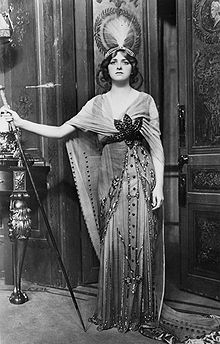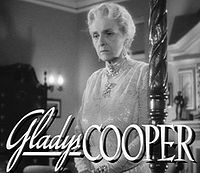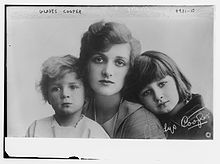- Gladys Cooper
-
Dame Gladys Cooper 
Gladys Cooper in 1913Born Gladys Constance Cooper
18 December 1888
Hither Green, England, UKDied 17 November 1971 (aged 82)
Henley-on-Thames, England, UKOccupation Actress Years active 1905–71 Spouse Capt. Herbert Buckmaster (1908–21)
Sir Neville Pearson (1928–36)
Philip Merivale (1937–46)Dame Gladys Constance Cooper, DBE (18 December 1888 – 17 November 1971) was an English actress whose career spanned seven decades on stage, in films and on television.
Beginning on the stage as a teenager in Edwardian musical comedy and pantomime, she was starring in dramatic roles and silent films by World War I. She also became a manager of the Playhouse Theatre from 1917 to 1933, where she played many roles. Beginning in the early 1920s, Cooper was winning praise in plays by W. Somerset Maugham and others. In the 1930s, she was starring steadily both in the West End and on Broadway. Moving to Hollywood in 1940, Cooper found success in a variety of character roles; she was nominated for three Academy Awards, the last one as Mrs. Higgins in My Fair Lady (1964). Throughout the 1950s and 1960s, she mixed her stage and film careers, continuing to star on stage until her last year.
Contents
Early life and career
Cooper was born at 23 Ennersdale Road, Hither Green, Lewisham, London, England, oldest of the three daughters of Charles William Frederick Cooper (1844–1939) by his marriage to Mabel Barnett (1861–1944). Her two younger sister were Doris Mabel Cooper Dickens (1891–1987) and Grace Muriel Cooper (1893–1982). She spent most of her childhood in Chiswick, where her family moved when she was an infant.
She made her stage début in 1905 touring with Seymour Hicks in his musical Bluebell in Fairyland. The young beauty was also a popular photography model. In 1906, she appeared as Lady Swan in London in The Belle of Mayfair and then in the pantomime Babes in the Wood as Mavis. The following year she became a chorus girl at the Gaiety Theatre, London, creating the small role of Eva in The Girls of Gottenberg. That Christmas, she was Molly in Babes in the Wood. In 1908, she appeared in the musical Havana followed, the next year, by Our Miss Gibbs, in which she played Lady Connie; more touring with Hicks in Papa's Wife; and Sadie von Tromp in the hit operetta The Dollar Princess at Daly's Theatre in 1909. In 1911, she appeared in a production of The Importance of Being Earnest and in Man And Superman. Among several other plays, the next year she was Muriel Pym in Milestones at the Royalty Theatre. A highlight of 1913 was Dora in Diplomacy at Wyndham's Theatre. That year she also played the title role in The Pursuit of Pamela at the Royalty.[1]


Cooper (l.) and Marie Studholme (c.1894) In 1913 she appeared in her first film, The Eleventh Commandment, going on to make several silent films during World War I and shortly afterwards. She continued full-time stage work, however, including appearances as Lady Agatha Lazenby in The Admirable Crichton in 1916 and Clara de Foenix in Trelawny of the Wells. In addition, in 1917, Cooper became co-manager, with Frank Curzon, of the Playhouse Theatre, taking over sole control from 1927 until she left in 1933. During these years, she starred several times in My Lady's Dress. She appeared in W. Somerset Maugham's Home and Beauty in 1919, repeated Dora at His Majesty's Theatre in 1920 and elsewhere thereafter, and played numerous roles at the Playhouse Theatre.[1]
It was not until 1922, however, now in her mid-30s, that she found major critical success, in Arthur Wing Pinero's The Second Mrs. Tanqueray. Early in her stage career, she was criticized for being stiff. Aldous Huxley dismissed her performance in Home and Beauty, writing, "she is too impassive, too statuesque, playing all the time as if she were Galatea, newly unpetrified and still unused to the ways of the living world."[2] Evidently, her acting improved during this period, as Maugham praised her for "turning herself from an indifferent actress to an extremely competent one" through her common sense and industriousness.[3] For the both the 1923 and 1924 Christmas shows at the Adelphi Theatre, she was the title character in Peter Pan, while playing several other roles at that theatre during these two years. She appeared in Maugham's The Letter in London and on tour in 1927 and 1928, Excelsior (adapted from "L'Ecole des Cocottes" by H. M. Harwood) in 1928, and Maugham's The Sacred Flame in 1929, also in London and on tour.[4]
Among other roles, she was Clemency Warlock in Cynara (1930), Wanda Heriot in The Pelican (1931), Lucy Haydon in Dr. Pygmalion (1932), Carola in The Firebird (1932), Jane Claydon in The Rats of Norway (1933), Mariella Linden in The Shining Hour in 1934 and 1935, in London and New York and on tour (at the same time making her first "talkie" film, The Iron Duke), also playing Desdemona and Lady Macbeth on Broadway in 1935. She was Dorothy Hilton in Call it a Day, again in both London and New York, from 1935 to 1936. A highlight of 1937 was Laura Lorimer in Goodbye to Yesterday in London and on tour. In 1938, she played Tiny Fox-Collier in Spring Meeting in New York, Montreal and Britain, as well as several Shakespeare roles and Fran Dodsworth in Dodsworth. She repeated Spring Meeting in 1939.[1]
Later career
Cooper turned to film full-time in 1940, finding success in Hollywood in a variety of character roles and was frequently cast as a disapproving, aristocratic society woman, although she sometimes played lively, approachable types, as she did in Rebecca (1940). She was nominated three times for an Academy Award for Best Supporting Actress for her performances as Bette Davis's domineering mother in Now, Voyager (1942), a skeptical nun in The Song of Bernadette (1943), and Rex Harrison's mother, Mrs. Higgins, in My Fair Lady (1964). Other notable film appearances included The Green Years (1946), The Secret Garden (1949), Separate Tables (1958) and The Happiest Millionaire (1967) as Aunt Mary Drexel, singing "There Are Those".
Her only stage roles in the 1940s were Mrs. Parrilow in The Morning Star in Philadelphia and New York (1942) and Melanie Aspen in The Indifferent Shepherd in England (1948). She returned to theatre (between films) more often in the 1950s and 1960s, playing in London and on tour in such roles as Edith Fenton in The Hat Trick (1950); Felicity, Countess of Marshwood, in Relative Values (1951 and 1953); Grace Smith in A Question of Fact (1953); Lady Yarmouth in The Night of the Ball (1954); Mrs. St. Maugham in The Chalk Garden (1955–56), Dame Mildred in The Bright One (1958); Mrs. Vincent in Look on Tempests (1960); Mrs. Gantry (Bobby) in The Bird of Time (1961); Mrs. Moore in A Passage to India (1962); Mrs Tabret in The Sacred Flame (1966 and 1967); Prue Salter in Let's All Go Down the Strand (1967); Emma Littlewood in Out of the Question (1968); Lydia in His, Hers and Theirs (1969); and others. She also had numerous television roles in the 1950s and 1960s.[1]
In 1967, at the age of 79, she was made a Dame Commander of the Order of the British Empire (DBE). Her last major success on the stage was at age 82, in 1970–71 in the role of Mrs. St. Maugham in Enid Bagnold's The Chalk Garden, a role she had created on Broadway and in the West End in 1955–56.[1]
Private life and last years
Cooper was thrice married:
- Captain Herbert Buckmaster (12 December 1908–12 December 1921) (two children, John and Joan Buckmaster (1910–2005), who married the actor Robert Morley).
- English baronet Sir Neville Pearson (1927–1936); (one daughter, Sally Pearson (aka Sally Cooper) who was married from 1961 to 1986 to the actor Robert Hardy).
- English actor Philip Merivale (30 April 1937–12 March 1946). She lived for many years in Santa Monica, California, as a permanent resident alien with her third husband, until his death at age 59 from a heart ailment. Her stepson from this marriage was John Merivale.
She lived mostly in the United Kingdom in her final years and died from pneumonia at the age of 82 in Henley-on-Thames, England.
Filmography
- The Eleventh Commandment (1913)
- Danny Donovan, the Gentleman Cracksman (1914)
- The Real Thing at Last (1916)
- The Sorrows of Satan (1917)
- My Lady's Dress (1917)
- Masks and Faces (1917)
- Unmarried (1920)
- The Bohemian Girl (1922)
- Bonnie Prince Charlie (1923)
- The Iron Duke (1934)
- Rebecca (1940)
- Kitty Foyle The Natural History of a Woman (1940)
- A Yank in the R.A.F. (1941)
(scenes deleted) - That Hamilton Woman (1941)
- The Black Cat (1941)
- The Gay Falcon (1941)
- Eagle Squadron (1942)
- This Above All (1942)
- Now, Voyager (1942)
- Mr. Lucky (1943)
- Forever and a Day (1943)
- Princess O'Rourke (1943)
- The Song of Bernadette (1943)
- The White Cliffs of Dover (1944)
- Mrs. Parkington (1944)
- The Valley of Decision (1945)
- Love Letters (1945)
- The Green Years (1946)
- Beware of Pity (1946)
- The Cockeyed Miracle (1946)
- Green Dolphin Street (1947)
- The Bishop's Wife (1947)
- Homecoming (1948)
- The Pirate (1948)
- The Secret Garden (1949)
- Madame Bovary (1949)
- Thunder on the Hill (1951)
- At Sword's Point (1952)
- The Man Who Loved Redheads (1955)
- Separate Tables (1958)
- The List of Adrian Messenger (1963)
- My Fair Lady (1964)
- The Happiest Millionaire (1967)
- A Nice Girl Like Me (1969)
Television
Among many other appearances, she starred in the 1960s in The Rogues with David Niven, Charles Boyer, Gig Young, Robert Coote, John Williams and Larry Hagman. For this, she won a Golden Globe Award in 1965.
She also appeared in three episodes of The Twilight Zone. In the first, entitled "Nothing in the Dark" (1962), she plays an old lady who refuses to leave her apartment for fear of meeting Death. A young policeman (Robert Redford) is shot at her doorstep and persuades her to let him in. Her second appearance was in the episode "Passage on the Lady Anne", which aired on 9 May 1963. Her final episode was in 1964, in "Night Call", portraying a difficult, lonely old lady who is besieged by late-night phone calls, which she learns too late are from the ghost of her long-dead fiancé.
Notes
- ^ a b c d e "Appearances". GladysCooper.com, accessed 12 February 2011
- ^ Alduous Huxley. "A Good Farce." Athenaeum September 26, 1919: 956.
- ^ W. Somerset Maugham. "Gladys Cooper." Plays and Players 1, 3 (December 1953): 4
- ^ "The Sacred Flame. Gladyscooper.com, accessed 12 February 2011
References
- Without Veils, by Sewell Stokes, introduction by Somerset Maugham, Peter Davis, London (1953).
- Gladys Cooper (1979), by Sheridan Morley
- Profile of Cooper
External links
Categories:- 1888 births
- 1971 deaths
- English actors
- English film actors
- English silent film actors
- English stage actors
- English television actors
- Dames Commander of the Order of the British Empire
- Actresses awarded British damehoods
- People from Chiswick
- Deaths from pneumonia
- Infectious disease deaths in England
Wikimedia Foundation. 2010.


